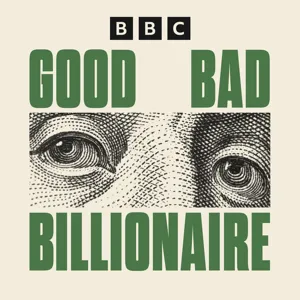Podcast Summary
Leveraging LinkedIn for Hiring and the Koch Family's Wealth and Influence: LinkedIn is a powerful hiring tool with 70% of users not visiting other job sites. The Koch family, with a net worth of $59.2 billion, demonstrates wealth and influence that can be inherited and built upon.
LinkedIn is a valuable resource for hiring professionals, especially those who aren't actively looking for a new job. With over 70% of LinkedIn users not visiting other leading job sites, businesses risk missing out on great candidates by not utilizing LinkedIn for their hiring needs. Meanwhile, the Koch family, specifically Charles Koch, serves as an example of immense wealth and influence. With a net worth of $59.2 billion, Koch Industries, which was founded on oil and has since expanded to own various other companies, has become a political powerhouse, spending an estimated $1 billion on the 2020 US election. This is a reminder that sometimes, wealth and influence are inherited and built upon, rather than starting from scratch. For businesses looking to hire and for those interested in the world of billionaires and their impact on politics, these key points provide valuable insights.
Fred Coke's Revolutionary Discovery and Legal Issues: Fred Coke revolutionized oil industry with efficient heavy crude oil cracking method but faced legal issues, forcing him to leave US and develop Russia's petroleum industry under Stalin. His son Charles, expelled from military school, struggled with behavioral issues throughout childhood.
Fred Coke, the founder of Universal Oil, revolutionized the industry by finding an efficient way to crack heavy crude oil into gasoline. However, his business practices led to legal issues, forcing him to leave the country and develop Russia's petroleum industry under Stalin. Meanwhile, his son Charles, who was sent away to boarding school at a young age due to behavioral issues, faced challenges throughout his childhood. Despite his demanding father's efforts to prevent it, Charles turned out to be a "bad boy," leading to expulsion from military school. These experiences shaped both Fred and Charles' lives, with lasting consequences for their family.
Charles Koch's challenging childhood shaped his business success: Early life hardships, including family disputes and pressure to join the family business, fueled Koch's determination and competitive nature, shaping his future business strategies
Charles Koch's tumultuous upbringing, including being sent to live with relatives in Texas after repeated family disputes, played a significant role in shaping his competitive nature and determination. Despite facing pressure from his father to join the family business, Koch found independence and success in his career, eventually returning to work for the company at the age of 26. The fear of regulation and the influence of his father's strong anti-communist beliefs also emerged early in his life and would later impact his business strategies. The complex dynamics within the Koch family illustrate the intricacies of intergenerational business relationships and the impact of personal experiences on professional success.
Consolidating and Renaming Businesses for Unity and Growth: At 32, Charles Koch took over Koch Industries after his father's death and consolidated various companies under one name, allowing him to bring unity and expand, resulting in significant growth from a multimillion-dollar company to a billion-dollar empire.
Charles Koch's early success in business led him to become the heir apparent of his family's multimillion-dollar enterprise, Koch Industries. However, at the age of 32, after his father's sudden death, Charles found himself in charge of the company with a workforce of 650 employees and a value of $50 million. To consolidate his control and bring a common philosophy across the various companies, Charles consolidated his father's businesses and renamed them Koch Industries in his honor. This move allowed him to bring unity and authority to the entire group and make significant moves, such as buying Great Northern Oil in 1969, which gave Koch Industries entry into the chemical industry and became a major cash cow. Despite facing challenges and making tough decisions, Charles' strategic consolidation and expansion led him on a path to growing Koch Industries from a multimillion-dollar company to a billion-dollar empire.
The Koch brothers' business and political beliefs led to family conflicts: The Koch brothers' involvement in the trucking industry and their political beliefs, particularly their disdain for communism, caused internal family conflicts and legal disputes, shaping the company's reputation and dynamics.
The Koch brothers' business ventures were marked by significant events, including their entry into the trucking industry with Mohawk, and their political beliefs, which led to internal family conflicts and a failed boardroom coup attempt against Charles in 1980. The family's shared hatred of communism, as espoused by their father Fred, led the brothers to become involved in the Libertarian party, causing a rift between them and their eldest brother Freddie and another twin Bill. Despite their differences, all brothers were shareholders in Koch Industries, leading to complex power struggles and legal disputes. Ultimately, the brothers' personal and political beliefs shaped the company's reputation and internal dynamics.
Koch Industries' Success Amidst Family Conflicts and Legal Battles: Charles Koch's market-based management philosophy and libertarian economics background contributed to Koch Industries' success, despite family conflicts and legal battles.
Despite intense family conflicts and legal battles among the Koch twins, Charles and David, Koch Industries continued to grow and expand, with assets worth billions by the late 1980s. Charles, in particular, had a unique business philosophy called market-based management, which he implemented throughout the company, empowering workers and incentivizing them to think like business owners. This approach, along with Charles's background in libertarian economics, contributed to the company's success. However, the company's management style was also criticized for being cutthroat, leading to discrimination lawsuits in the late 1990s. Nonetheless, the Koch brothers' business acumen and unconventional management strategies made them billionaires.
Whole Foods discounts for Mother's Day and PlushCare's weight loss solution: Whole Foods offers discounts on body care, candles, and tulips for Prime members, while PlushCare provides online access to physicians for weight loss medication prescriptions.
Whole Foods Market offers significant savings on various products this Mother's Day, including body care and candles with a 33% discount for Prime members, tulips at a discounted price, and special treats for mom's menu. Meanwhile, PlushCare provides online access to board certified physicians who can prescribe weight loss medications for those who qualify, making it an effective way to begin a weight loss journey. Elsewhere, the influence and political activities of the Koch family, collectively known as the "Kochtopus," have been shaping American politics since the 1980s. They have funded think tanks, political action groups, and lobbying groups, and have been major donors to the Republican Party. Their extensive network and significant financial resources have granted them considerable influence in politics, particularly during the Obama presidency and the rise of the Tea Party.
The Koch brothers' political influence: The Koch brothers, through their fortune and strategic use of anonymous funding, significantly impacted US politics, particularly on climate change issues, via think tanks, campaign groups, and super PACs, amplified by Citizens United ruling, leading to concerns over 'dark money' in democracy, spending nearly $1 billion on the 2020 election.
The Koch brothers, through their vast fortune and strategic use of anonymous funding, have significantly influenced US politics, particularly around issues like climate change, by funding think tanks, campaign groups, and political campaigns through super PACs. This influence was amplified by the Citizens United Supreme Court ruling, which allowed corporations to spend unlimited sums on political campaigns without revealing the sources of their funding. The Koch Industries, which encompasses a wide range of businesses, has been able to hide the origins of their political spending, leading to concerns about the role of "dark money" in American democracy. Despite controversy, the Koch brothers' political influence continues to grow, with estimates suggesting they spent nearly $900 million on the 2016 election and over $1 billion on the 2020 election. Their wealth, villainy, power, and philanthropy continue to be subjects of debate.
The Koch Brothers' Controversial Business Practices and Political Influence: Despite their significant philanthropy, the Koch Brothers' score is high due to their questionable business practices and political activities, including illegal oil extraction, numerous oil spills, climate change denial funding, and controversial political involvement.
The Koch brothers, known for their vast wealth and political influence, score a 7 out of 10 in wealth category, but their actions in areas like villainy and climate change denial bring their score up to a 9. Their history includes illegal oil extraction from Native American lands, numerous oil spills, and funding groups accused of fueling climate change denial. In contrast, their philanthropic efforts, estimated to be around $1.9 billion, are seen as a redemption, but only to a certain extent due to potential tax incentives. The brothers' score in the rags-to-riches category is a low 2, as they were born into wealth, and their father's mission was to prevent them from becoming country club bums. The discussion also touched upon their controversial political activities, which depend on individual political beliefs.
The Koch brothers' complicated legacy in politics: The Koch brothers significantly influenced US politics with their private capital, but the morality of their actions is debated.
The Koch brothers, despite their influence in shaping political ideas and mobilizing vast private money in political causes, had a complicated legacy. At the height of their power, they were extremely influential, able to influence politicians across the political spectrum. However, their power may be waning, and they have expressed regret for some of their partisan activities. The Koch brothers set an important precedent for private capital in political life, but the morality of this influence is debatable. Despite this, it's clear that money still plays a significant role in US politics and beyond.
Charles Koch's Controversial Business Practices: Despite being a billionaire, Charles Koch's business practices in oil production have led to criticism due to numerous oil spills and questionable ethics, as well as his involvement in politics.
Key takeaway from this episode of "Good, Bad, Billionaire" is that while Charles Koch, co-founder of Koch Industries, has amassed great wealth, his business practices and involvement in oil production have led to criticism. With over 300 oil spills across various states and reportedly taking oil from Native American reservations, Koch has been labeled a "bad billionaire" due to his lack of responsiveness to environmental concerns and questionable business ethics. Additionally, his involvement in big money politics raises further concerns. The next episode will feature Gina Rinehart, currently the 8th richest woman in the world, known for her fortune in iron mining.






